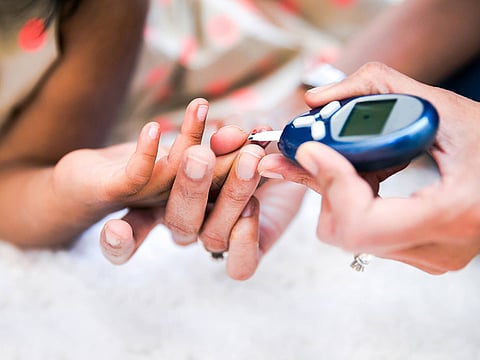Beware: Diabetes patients are at high risk of heart disease
Survey in UAE unearths low awareness of type 2 diabetes and knowledge of the risk factors

At a glance
- The survey covered residents from all emirates with a majority of patients from Dubai
- The survey revealed a clear knowledge-gap in the average patient
- Type 2 diabetes damages the coronary artery
- Managing Type 2 diabetes right at the outset can help deliver better patient outcomes
Dubai: Over 74 per cent Type 2 diabetes patients are not aware they are at high risk for heart disease, a nationwide survey revealed on Tuesday.
The survey covered residents from all emirates with a majority of patients from Dubai and included 25 per cent Emiratis, 40 per cent Arab nationals, 35 per cent Asian and one per cent Western expatriates.
The survey, conducted by the market research organisation Ipsos for the Emirates Diabetes Society (EDS) in conjunction with pharmaceutical company Boheringer Ingleheim, interviewed 604 diabetics.
Dr Abdul Razzak Ali Al Madani, President of the Emirates Diabetes Society stressed on the importance of the awareness of heart disease. “While most Type II diabetics said they were aware that diabetes caused neuropathy, blindness and kidney disease, only 20 per cent were aware that diabetes could cause Cardio Vascular Disease (CVD). This is alarming because nearly 17 per cent of these already were patients of CVD.”
He added that over 52 per cent of patients with Type 2 diabetes died of cardiovascular causes. Therefore, the epidemic of Type 2 diabetes was likely to be followed by an epidemic of diabetes-related CVDs. CVDs are also the number one cause of death globally, with more people dying annually from CVDs than any other cause.
Low awareness
Dr Madani pointed out it was important to educate general physicians and endocrinologists along with the patients to make them aware of the risk they face. “Already over 1.8 million people in the UAE suffer from diabetes and many must be at high risk for CVD. An awareness campaign with doctors and patients would help them prevent any damage to the heart.”
Also Read: A better life with diabetes
The survey revealed a clear knowledge-gap in the average patient. The majority of respondents to the survey were males in 30-40 year old age bracket and had visited a physician in the past 1-3 months. The survey unearthed considerably low awareness of Type 2 diabetes and knowledge of the risk factors and after effects. The study also identified incorrect perceptions surrounding the disease, associated conditions and their management.
The ‘close to your heart’ campaign
While Type 2 diabetes is known to cause a variety of health complications such as numbing of the peripheral and optic nerves and kidney disease, few know that diabetes damages the coronary artery, causes higher incidence of accumulation of bad cholesterol which gets deposited in the arteries narrowing them and making diabetics more at risk for CVD.
The ‘close to your heart’ campaign will spread the message through media awareness, take it door-to-door digitally through social media and also target general physicians and endocrinologists who can educate their patients.
In addition, Mazen Bachir, General Manager — Gulf at Boehringer Ingelheim pointed out that people failed to see the co-relation between diabetes and heart disease and awareness could help them take preventive steps to ward off heart disease. “The launch of this campaign comes at an important time as part of our efforts to bridge the gap between Type 2 diabetes and associated CVD risks. Managing
Type 2 diabetes right at the outset can help deliver better patient outcomes. Despite advances in health care, CVD is still the number one cause of death among people with Type 2 diabetes,” Bachir said.
Interested people are encouraged to log on to the Emirates Diabetes Soceity website www.eds.ae. The website has standard questions that can help diabetics to frame their own set of queries for their endocrinologist.
Knowledge library
The campaign will also include a knowledge library that curates information from both the medical community and patient stories.
The permanent digital library will be live on a dedicated website, with supporting content including a digital 360 campaign that features an awareness video, infographics and several media activities.
Sign up for the Daily Briefing
Get the latest news and updates straight to your inbox



